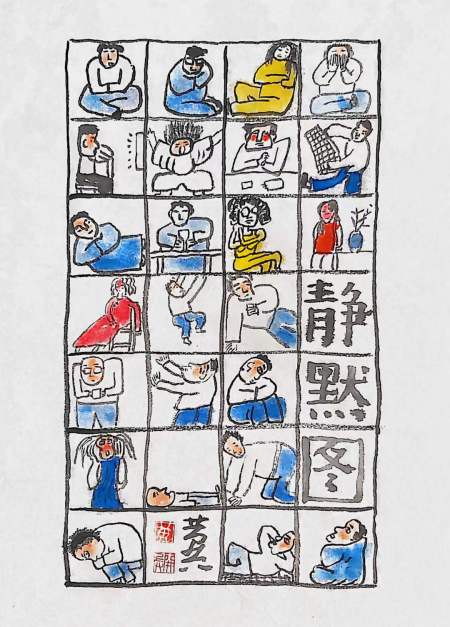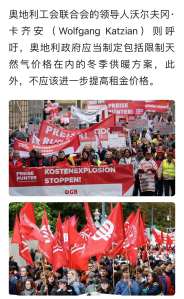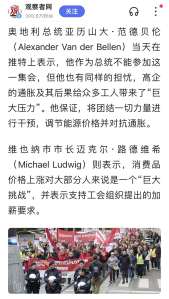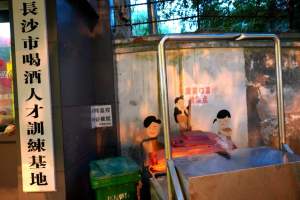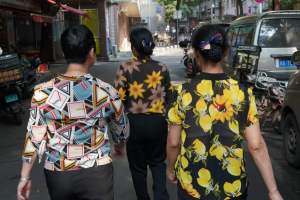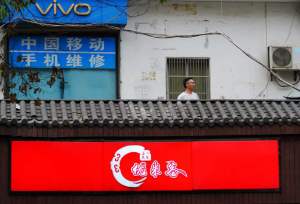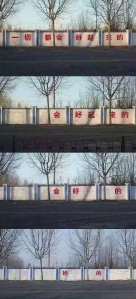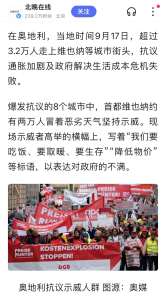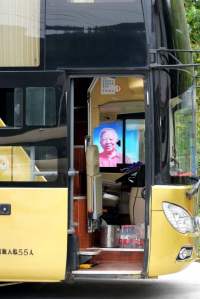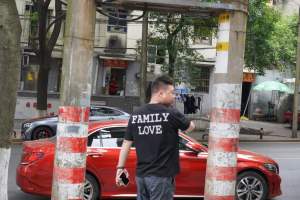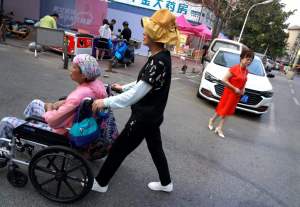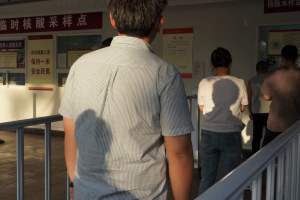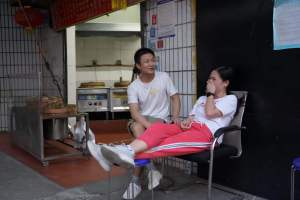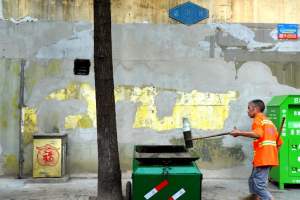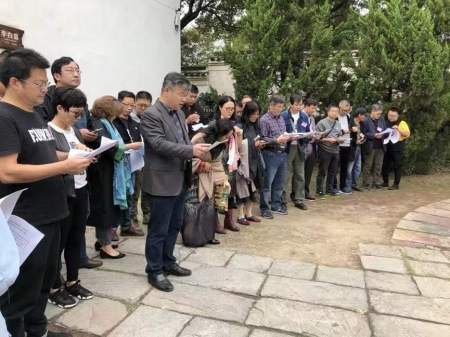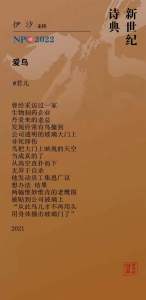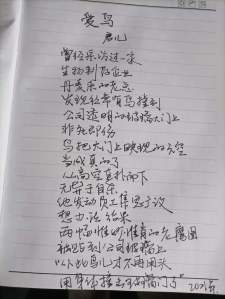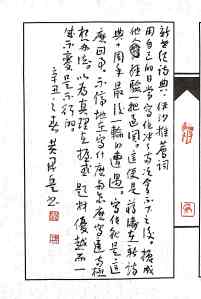
Photo by Liu Xia
20
20 years ago I wrote my first Chinese poem.
It was in Chongqing. “Wanbao, wanbao!”
That’s what they cry, all over China. Every afternoon.
“Evening news, evening news!”
Evening paper, every town has one.
Some have morning papers, those are called Zaobao,
most of them.
“Get your evening paper!”
Anyway, “wanbao, wanbao!”
could mean late retribution. Bào, what comes back, gets back,
a report. Wan, late. Zao, early.
“Wanbao, wanbao!”
Chongqing was the wartime capital.
Jiefang bei, liberation monument, is the city center.
It’s not from 1945 or 1949,
it’s from the 1930s or so.
Most people don’t know exactly.
Emancipation column. One of my students called it that.
Kang Di, think it was her.
Emancipation in German means women’s lib.
“Emanzipationssäule”.
I was teaching German.
Women’s Liberation Monument.
Women’s Rights Monument.
She didn’t know emancipation means many things.
Didn’t want to correct her.
Another essay was about marriage.
Were they really so conservative, our elders,
when they married a stranger,
when they slept with a stranger they had never seen before?
Good question.
Good essays, especially the girls, the young women.
“Wanbao, wanbao!”
In Beijing it sounded more like “wanbo!”, although Beijing supposedly
is where Mandarin comes from.
“Wanbao, wanbao!”
Chongqing is a hilly city. No bicycles. What did they do, back in the 1960s,
1970s, ’80s, when no-one had a car?
They had porters, for the steep slopes with the stairs,
I guess they’re still there.
“Bang-bang”, people for hire.
They bang on their tools, bang their tools together.
Bang-bang are men, but there are women porters.
Hong Ying’s mother carried sand, rocks and gravel.
Daughter of Hunger, her most famous book.
Daughter of the River in English, it was a bestseller.
Hungry Daughter, Ji’e de nü’er.
That’s right, they have a “ü”, just like in German,
and like in Turkish. Ürümqi, city in China,
nowadays governed like North Korea.
Many re-education camps. They had prisons in Chongqing,
Liao Yiwu was in there,
another famous writer from China.
Didn’t know him then. But Chongqing is about war and imprisonment.
Lieshimu, that’s the address
of our university. We taught German and English.
Two universities, one foreign languages,
the other law and police. Law and politics. Yes, they are not separated.
“Wanbao, wanbao!” No zaobao in Chongqing,
although I’m not sure now.
Lie-shi-mu, Martyr’s Grave.
Geleshan, Gele Mountain, right behind our college,
other side of the train tracks.
Someone was murdered there, some gambling debt.
Students died, one or two every few months.
Nice walks on Geleshan, very peaceful, really.
“Wanbao, wanbao!” Every city in China.
Nowadays people have cell phones,
but there are printed newspapers and magazines.
And printed books, there is no crisis.
“Wanbao, wanbao!” Late reports, late reports.
From the guns. Or whatever.
Karma. Shan means good, doing good.
A Buddhist word. Shan you shanbao,
doing good has good returns.
Wouldn’t that be nice?
But teachers believe it, teachers and parents,
again and again, otherwise you go crazy.
They went crazy too, war and famine,
all the way till 1961, ’62. When Hong Ying was born.
No, also 1969,
Cultural Revolution, like civil war.
Shan you shan-bao,
good deeds, good returns.
“Shan you shanbao, e you e-bao.”
E like in Urgh! Like something disgusting, that’s what it means.
Ur yow ur-pow, something like that. But more like b.
Eh yow e-bao. Yes, “e” like ur. “You” like yo-uw.
Shàn you shànbào, è you èbao.
Do good for good returns, do bad stuff for bad returns.
Not that it doesn’t come back, time isn’t ripe.
That’s how it goes on.
You throw the boomerang, boomerang doesn’t come back,
they tell you wait, it’ll come back.
Karma.
And so I wrote a Buddhist newspaper poem.
Bu shì bu bào, shíhou wei dào.
Wei like in Ai Weiwei, “ei” like in Beijing.
Wei means not yet, that’s his name. Really.
“Wei” like the future.
His father was the most famous Communist poet
of the People’s Republic. Imprisoned in the 1930s,
maybe in Chongqing. Then again under Mao.
Exiled to Xinjiang, North Korea today, re-education camps.
Desert, somewhere between Dunhuang and Ürümqi,
what was the town? It’s a big city now.
Ai Weiwei grew up in a hole in the ground, with his brother.
They are both artists. Anyway, where was I?
Bu shì bu bào, shíhou wei dào.
Not that it doesn’t come back, time isn’t ripe.
Emancipation monument.
MLK day, I have a dream.
They had to memorize the whole speech,
in schools in China, 1970s.
Maybe earlier too, maybe till now.
Good deeds, good returns.
Bad deeds, bad returns.
The Chinese Dream.
Not that it doesn’t come back.
Zao you zaobao, wan you wanbao.
Morning has morning papers, evening has evening news.
Early deeds, early returns.
Late deeds, late returns.
Late returns after gambling.
Famous party secretary, famous police chief,
they are in prison now. Or one is dead?
Killed a British guy, now they imprison Canadians.
Anyway, my poem.
Wanbao, wanbao!
Wanbao, wanbao!
Zao you zaobao,
wan you wanbao.
Bushi bu bao, shihou wei dao.
Actually the saying goes on, the Buddhist Karma.
Once time is ripe, everything comes back.
You don’t need to say that. People know.
晚报,晚报!
早有早报,晚有晚报。
不是不报,时候未到!
MW January 2019

Artwork by Liu Xia

Photos by Liu Xia
